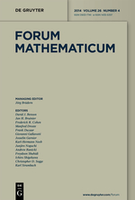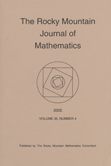
Bulletin Mathematique de la Societe des Sciences Mathematiques de Roumanie
Scope & Guideline
Elevating Mathematical Knowledge for Global Impact
Introduction
Aims and Scopes
- Algebra and Number Theory:
Emphasizes research in algebraic structures, number theory, and related areas, including polynomial equations, congruences, and algebraic integers. - Geometry and Topology:
Covers a range of topics in geometry, including algebraic geometry, differential geometry, and topology, exploring properties of spaces and geometric structures. - Graph Theory and Combinatorics:
Focuses on the study of graphs, their properties, and combinatorial structures, including applications to various mathematical problems. - Functional Analysis and Operator Theory:
Investigates the properties of functional spaces and operators, contributing to the advancements in understanding infinite-dimensional spaces. - Mathematical Logic and Foundations:
Addresses foundational aspects of mathematics, including set theory, model theory, and the implications of logical frameworks in mathematical discourse. - Applied Mathematics:
Explores mathematical methods and models applied to real-world problems, incorporating interdisciplinary approaches that link mathematics with physics, engineering, and computer science.
Trending and Emerging
- Algebraic Geometry and Cohomology:
There is an increasing interest in algebraic geometry, particularly in cohomological methods and their applications to various mathematical structures, revealing a trend towards deepening the connections between algebra and geometry. - Quantum Groups and Representation Theory:
Research on quantum groups and their representations has gained momentum, reflecting a growing fascination with the interplay between algebra and quantum physics. - Graph Theory Applications:
The application of graph theory to complex systems, networks, and combinatorial designs is trending, highlighting its relevance in both pure mathematics and applied fields. - Computational Mathematics and Algorithm Development:
An emerging focus on computational approaches and algorithm development reflects the need for numerical methods and simulations in solving complex mathematical problems. - Mathematical Physics:
There is a rising trend in the intersection of mathematics and physics, particularly in areas such as mathematical modeling, statistical physics, and the study of dynamical systems.
Declining or Waning
- Classical Analysis and Function Theory:
There has been a noticeable reduction in papers focusing on classical analysis and traditional function theory, suggesting a shift towards more abstract or applied mathematical topics. - Discrete Mathematics:
Although still present, the frequency of publications specifically dedicated to discrete mathematics has decreased, possibly due to the rise of more interdisciplinary approaches involving computational methods. - Real Analysis and Measure Theory:
Research articles specifically centered on real analysis and measure theory appear to be declining, reflecting a potential trend towards more specialized or advanced topics in analysis.
Similar Journals

INDIAN JOURNAL OF PURE & APPLIED MATHEMATICS
Advancing Mathematical Frontiers Since 1996INDIAN JOURNAL OF PURE & APPLIED MATHEMATICS, published by the INDIAN NATIONAL SCIENCE ACADEMY, stands as a vital resource in the realm of pure and applied mathematics since its inception in 1996. With ISSN 0019-5588 and E-ISSN 0975-7465, this journal aims to disseminate original research that advances the understanding and application of mathematical principles. Operating out of New Delhi, India, it serves a diverse readership comprising researchers, scholars, and practitioners in the mathematical sciences. Recognized within the Q3 category in both Applied Mathematics and Miscellaneous Mathematics as per the 2023 category quartiles, the journal emphasizes rigorous peer-reviewed articles that contribute to its impact in academia, reflected in its Scopus rankings. Although it does not currently operate as an open-access journal, it maintains a commitment to quality and accessibility of scholarly content, striving to foster academic collaboration and innovation. The convergence of full-text issues from 1996 to 2024 highlights its ongoing dedication to the evolution of mathematical research.

ANNALES DE L INSTITUT FOURIER
Advancing Mathematical FrontiersANNALES DE L INSTITUT FOURIER is a premier academic journal published by ANNALES INST FOURIER, specializing in the fields of Algebra and Number Theory as well as Geometry and Topology. Since its establishment, the journal has garnered a distinguished reputation, evidenced by its Q1 quartile ranking in the 2023 category assessments and its Scopus Rank of #37 out of 119 in Algebra and Number Theory, and #34 out of 106 in Geometry and Topology, placing it within the top percentile of its field. The journal serves as a vital platform for disseminating groundbreaking research and innovative methodologies, catering to a global audience of researchers, professionals, and students. With a commitment to the advancement of mathematical sciences, ANNALES DE L INSTITUT FOURIER invites contributions that push the boundaries of knowledge and foster collaboration across disciplines. Although it does not offer open access, the rigorous peer-review process ensures that published papers meet the highest academic standards, making it a critical resource for anyone engaged in advanced mathematical research.

COLLOQUIUM MATHEMATICUM
Engaging minds with groundbreaking mathematical concepts.COLLOQUIUM MATHEMATICUM, published by ARS POLONA-RUCH, serves as an essential platform for the dissemination of innovative research in the field of mathematics. With an ISSN of 0010-1354 and a dedicated E-ISSN of 1730-6302, this journal plays a crucial role in advancing mathematical knowledge and fostering collaboration within the academic community. Although it is categorized in the Q3 quartile for miscellaneous mathematics, its content consistently attracts a diverse readership, reflecting a wide array of mathematical disciplines. Spanning publication years from 2001 to 2009 and resuming from 2011 to the present, *COLLOQUIUM MATHEMATICUM* offers researchers, professionals, and students the unique opportunity to engage with groundbreaking concepts and methodologies. With its home base in Warsaw, Poland, this journal not only contributes to the regional mathematical landscape but also impacts the broader global community. While currently not adopting an open access model, the journal remains committed to quality research, evidenced by its Scopus ranking within the general mathematics category. Engage with *COLLOQUIUM MATHEMATICUM* to be at the forefront of mathematical exploration.

Periodica Mathematica Hungarica
Elevating Research Standards in Mathematical Studies.Periodica Mathematica Hungarica is a prestigious academic journal published by Springer, focusing on the field of mathematics, with a particular emphasis on miscellaneous mathematical studies. Established in 1971, this journal has maintained its commitment to advancing mathematical research and its applications, making significant contributions over its converged years through 2024. With a Q2 ranking in the mathematics category as of 2023, it establishes itself as a vital resource within the mathematical community. Researchers and academics will find its inclusion in the Scopus database, ranking #189 out of 399 in general mathematics, indicative of its impact and relevance. Although it does not feature open access, the journal provides a wealth of high-quality peer-reviewed articles, thereby serving as an essential platform for the dissemination of innovative mathematical theories, methodologies, and findings. Engaging with the content of Periodica Mathematica Hungarica is crucial for anyone looking to stay at the forefront of mathematical research and development.

FORUM MATHEMATICUM
Elevating Mathematical Discourse Since 1989FORUM MATHEMATICUM, published by WALTER DE GRUYTER GMBH, is a distinguished academic journal based in Germany, known for its significant contributions to the field of mathematics. With an ISSN of 0933-7741 and an E-ISSN of 1435-5337, the journal features comprehensive studies ranging from applied mathematics to diverse mathematical disciplines. Having maintained a commendable presence since 1989, FORUM MATHEMATICUM has achieved notable classification rankings, including Q2 in Applied Mathematics and Q1 in miscellaneous Mathematics as of 2023. Additionally, it holds a Scopus rank within the top 60th percentile in General Mathematics, making it a prominent platform for researchers and professionals seeking rigorous analysis and innovative methodologies in mathematics. While the journal does not currently offer open access, its rich content is pivotal for advancing mathematical theory and applications, appealing to students and seasoned academics alike.

Matematicki Vesnik
Championing high-quality research in the mathematical community.Matematicki Vesnik is a distinguished open-access journal published by the MATH SOC SERBIA-DRUSTVO MATEMATICARA SRBIJE, dedicated to advancing the field of mathematics since its inception. With an ISSN of 0025-5165 and an E-ISSN of 2406-0682, this journal has been a significant platform for disseminating research findings since its establishment in 1993. Hosted in Serbia, it embraces a broad scope of mathematical discourse while achieving a Q3 category ranking in miscellaneous mathematics for 2023. As part of its commitment to fostering scholarly communication, Matematicki Vesnik is accessible to a global audience, promoting high-quality research and innovative ideas within the mathematical community. With converged years from 1999 to 2024 and a Scopus rank of #232 out of 399 in General Mathematics, the journal plays a crucial role in enhancing visibility and impact for researchers, professionals, and students alike in the dynamic landscape of mathematical inquiry.

BULLETIN DE LA SOCIETE MATHEMATIQUE DE FRANCE
Nurturing a vibrant community of mathematical thinkers.Welcome to the BULLETIN DE LA SOCIETE MATHEMATIQUE DE FRANCE, a distinguished journal published by the French Mathematical Society, dedicated to advancing the field of mathematics. With an ISSN of 0037-9484 and an E-ISSN of 2102-622X, this journal has made significant contributions to mathematical research since its establishment, maintaining a Q1 categorization in the Mathematics (miscellaneous) field as of 2023. Covering a range of mathematical topics, it serves as a vital platform for novel research findings and theoretical advancements. Although currently not open access, the BULLETIN remains accessible to a worldwide audience of researchers, professionals, and students eager to delve into the intricacies of mathematical inquiry. Situated in Marseille, France, it aims to foster collaboration and dissemination of knowledge, ensuring that high-quality research reaches its intended audience. Join a community that values the exploration and discourse around mathematics, and stay informed about the latest developments in this ever-evolving discipline.

PUBLICATIONES MATHEMATICAE DEBRECEN
Pioneering Insights in Theoretical and Applied MathematicsPublicationes Mathematicae Debrecen is a renowned international journal published by the University of Debrecen, Institute of Mathematics, situated in Hungary. This journal, with both ISSN 0033-3883 and E-ISSN 2064-2849, has established itself in the field of mathematics since its inception, with coverage extending from 1997 to 2024. Recognized for its rigorous academic standards, it currently holds a Q3 ranking in the mathematics (miscellaneous) category for 2023 and ranks at the 42nd percentile among general mathematics journals in Scopus. Publicationes Mathematicae Debrecen aims to disseminate high-quality research across various areas of mathematics, contributing to the advancement of knowledge and practice in this dynamic field. Although it is not an open-access journal, its readers can access a wealth of scholarly work that addresses both theoretical and applied mathematical issues, making it an invaluable resource for researchers, professionals, and students alike.

ROCKY MOUNTAIN JOURNAL OF MATHEMATICS
Championing Rigorous Research in MathematicsROCKY MOUNTAIN JOURNAL OF MATHEMATICS, published by the Rocky Mountain Math Consortium, serves as a critical platform for researchers and practitioners in the field of mathematics since its inception in 1971. With a notable presence in the academic community, this journal covers a broad spectrum of mathematical disciplines, positioning itself in the Q2 category for Mathematics (miscellaneous) as of 2023. Despite being a subscription-based journal, it is recognized for its rigorous peer-review process and contributions to theoretical and applied mathematics, helping to advance knowledge and foster collaboration among mathematicians. The journal's ISSN number is 0035-7596 and its E-ISSN is 1945-3795, reflecting its commitment to accessibility and dissemination of high-quality research. Based in Tempe, Arizona, at Arizona State University, the journal continues to play an important role in shaping contemporary mathematical discourse through well-researched articles and innovative studies, aiming to bridge gaps between various mathematical subfields and engage a diverse audience, including students and established researchers alike.

JOURNAL OF THE EUROPEAN MATHEMATICAL SOCIETY
Connecting Theoretical Insights with Practical ApplicationsThe JOURNAL OF THE EUROPEAN MATHEMATICAL SOCIETY, published by the EUROPEAN MATHEMATICAL SOCIETY (EMS), stands as a premier platform in the field of mathematics, known for its rigorous editorial standards and impactful contributions to both applied and theoretical aspects of the discipline. With a commendable Q1 ranking in both Applied Mathematics and Miscellaneous Mathematics categories, alongside a Scopus rank of 32 out of 399 in General Mathematics, this journal has established itself as a crucial resource for researchers and professionals. Since achieving Open Access status in 2021, it has expanded its reach, making cutting-edge research more accessible to a global audience. With a publication horizon extending from 2002 to 2024 and a dedicated focus on high-quality mathematical scholarship, the journal continues to foster innovation and collaboration within the mathematical community.